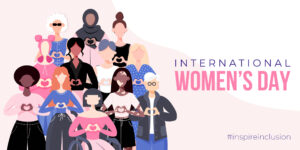‘Imagine a gender equal world. A world free of bias, stereotypes and discrimination. A world that’s diverse, equitable and inclusive. A world where difference is valued and celebrated.’
That is the call on the home page of the official International Women’s Day website, encouraging us to collectively #inspireInclusion.
Every year in March there is a shout to accelerate women’s equality. It has grown into a global phenomenon from its first gathering in 1911. It sees businesses, organisations and governments around the world celebrate the achievements women bring to the world of work and beyond.
It is a powerful movement that undoubtedly raises awareness of the challenges women continue to face in the workplace and across society.
And then it stops. The focus quickly reverts to business as usual.

Women continue to face the same challenges on the 9 March, in April, May and June. The challenges women face in the workplace continue throughout the year. Promotions will be overlooked, glass ceilings descend, pay inequality continues and discrimination remains rife. The contributions women bring to their employers can remain overlooked.
I am sure that I am not alone in feeling the virtue signalling by organisations, businesses and governments on 8 March is a little contrived and uncomfortable.
Now please do not misinterpret my thoughts. International Women’s Day is an important reminder of the contribution women make in the workplace and beyond, and, sadly, it is still very much needed.
What International Women’s Day does is remind the world of the extraordinary expertise and presence that half the population of the UK contributes to the work of work. The workplace is quite literally bursting with talent.
That contribution, however, is made every single day of the year. Why do we wait until the 8 March to celebrate those achievements? Surely we should celebrate those achievements every single day of the year?
But, of course, it should extend beyond that. That women are often still paid less than their male colleagues is shameful. There is a need to address the enormous loss of talent when women feel they have no choice but to forego a promotion or leave their jobs to start a family. And whilst working patterns have changed over the past three years, a culture of presentism, particularly in the City, is returning that automatically disadvantages women who still shoulder much of the responsibility of child-raising and homemaking.
As we celebrate the achievements of women on International Women’s Day, let us aim to continue to do so on the remaining 364 days of the year and deliver that ‘gender equal world and a world free of bias, stereotypes and discrimination.’
The above is accurate as at 08 March 2024. The information above may be subject to change.





